Free home visits
with a local audiologist
Wireless accessories for hearing aids have revolutionised the way people with hearing loss experience the world around them. These innovative devices offer a wide range of benefits that enhance the functionality, convenience, and overall quality of life for individuals who rely on hearing aids.
Digital hearing aid manufacturers are constantly developing their approach to hearing care to make a dramatic difference to those with hearing loss and ultimately improve their quality of life. Giving you flexibility, convenience, and useful tools to complement your lifestyle and needs.
Here we take a look at all the popular hearing aid accessories available on the market from all the main manufacturers, how they can help you, and the alternatives throughout the brands. Please remember that this list is not exhaustive, and compatibility depends on what hearing aids you currently have.
If your hearing aid supports wireless connectivity, you can use hearing aid accessories to connect to various devices such as your television. We recommend that you speak with your local audiologist to advise you on what hearing aid accessories would benefit you the most.
Can you buy hearing aid accessories online? Although most hearing aid wearers prefer to go through their audiologist for their hearing aid accessories, you can source and purchase them online easily. If this is the route you wish to take, ensure that you research prices and the warranty policy.
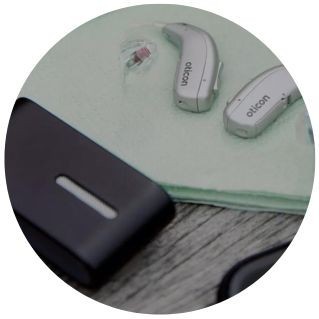
Most hearing aids come with a choice of accessories that can be purchased at the time or after the hearing aids have been worn for some time. These include wireless transmitters that enable the sound from a television, telephone, or other devices to “beam” sound into the hearing aid.
The need for certain assistance by way of accessories can sometimes heavily influence the choice of make or model of hearing aid required. There are some useful ones, and you should discuss accessories with your hearing aid dispenser, as you may be missing out.
As I mentioned earlier, a lot of our customers prefer to go through the audiologist we put them in touch with to source their hearing aid accessories. Most audiologists keep a small selection in stock of popular hearing aid accessories, but if they don't have the accessory you require, they can order these products for you.
What are the best hearing aid accessories for me? What do the hearing aid brands have to offer?
Here are quick links to more information about digital hearing aid accessories offered by each of the following manufacturers available in the UK audiology market:
►Oticon hearing aid accessories click here
►Phonak hearing aid accessories click here
►Unitron hearing aid accessories click here
►Starkey hearing aid accessories click here
►Signia hearing aid accessories click here
►Widex hearing aid accessories click here
►Resound hearing aid accessories click here

A wireless microphone is a device that can be used in conjunction with hearing aids to amplify sound. The microphone can be placed near the source of the sound, such as a speaker or television, and the audio is transmitted wirelessly to the hearing aid, allowing the wearer to hear the sound more clearly.
Good for hands-free calls, streaming music from your mobile, controlling your hearing aids remotely, and enhancing someone’s voice from a distance with this hearing aid accessory.
Wireless microphones are considered one of the best hearing aid accessories to improve speech understanding. Enjoy clear conversations in busy atmospheres, like restaurants and coffee shops, by changing your hearing aids into wireless headphones, gaining high-quality sound wherever you are. Oticon's ConnectClip is a great example of this, as seen in this image.
The person you are talking to would wear the clip-on hearing aid accessory and their voice will be transmitted straight into your hearing aids.
It'll be different for other brands, but with Oticon, you can use the ConnectLine microphone instead, using the Streamer Pro to benefit from easier and more comfortable conversations. However, some older hearing aid models might not be compatible with wireless microphone hearing aid accessories.
Speak with your audiologist to determine if your particular hearing aid is compatible with a wireless microphone.
Wireless microphones can be particularly useful for those with hearing loss who have difficulty hearing in noisy environments or at a distance. For example, a person could use a wireless microphone to listen to a lecture in a classroom or to hear a speaker at a meeting. Extra support for students with hearing loss or people who wear hearing aids in the workplace is beneficial for everyone.
Employers can adopt hearing aid accessories as part of their reasonable adjustments to provide a safe and inclusive work environment for employees with hearing loss.
Some wireless microphones are also equipped with additional features, such as noise reduction technology, which can further improve the clarity of sound and speech understanding.
This hearing aid accessory is for everyday use and can be purchased from your audiologist. There are a few different types of wireless microphones available, including those that are worn around the neck (also known as a neck loop, for example, the Phonak Roger NeckLoop) or attached to a clothing lapel, as well as those that are handheld.
The specific type of wireless microphone that is best suited for an individual's needs will depend on their preferences and the specific features they are looking for.
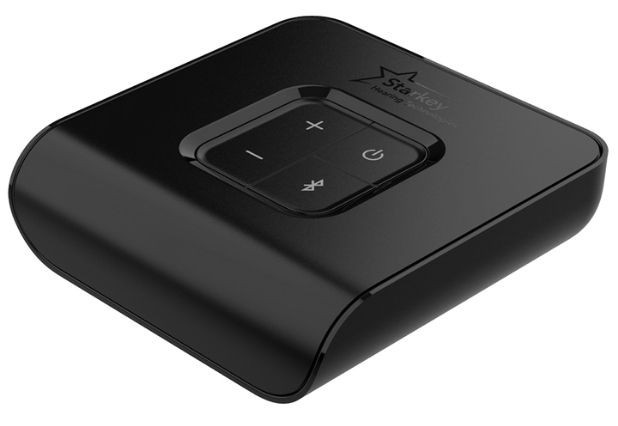
A TV adapter is a device that can be used in conjunction with hearing aids to amplify the sound from a television. This hearing aid accessory is the best for seniors. The adapter is connected to the television and transmits the audio wirelessly to the hearing aid, allowing the user to hear the sound more clearly and giving better TV sound.
Connect your hearing aids to your TV and enjoy watching your favourite programs at the volume you want, so your family can hear at their level. Starkey's Universal TV Streamer is a great example of this, as seen in this image.
Simply connect the adapter to your TV and place it next to it to enjoy streaming audio wirelessly. Listen to the TV at the volume that suits you without having to turn up the TV's volume and annoy your friends or family!
This is for everyday use, and you can purchase a TV adapter hearing aid accessory from your audiologist. They are ideal for a more comfortable listening experience and can decrease listening fatigue, reducing the mental strain and allowing the patient to enjoy their entertainment, both of which can lead to improved mental health and quality of life.
TV adapters can be particularly useful for individuals with hearing loss who have difficulty hearing the television, especially in noisy environments or when the volume is low. Using a TV adapter can allow the user to adjust the volume of the television to a level that is comfortable for them, without disturbing others in the room.
There are a few different types of TV adapters available, including those that use Bluetooth technology to connect to the hearing aid and those that use a proprietary wireless connection. The specific type of TV adapter that is best suited for an individual's needs will depend on their preferences and the specific features they are looking for.
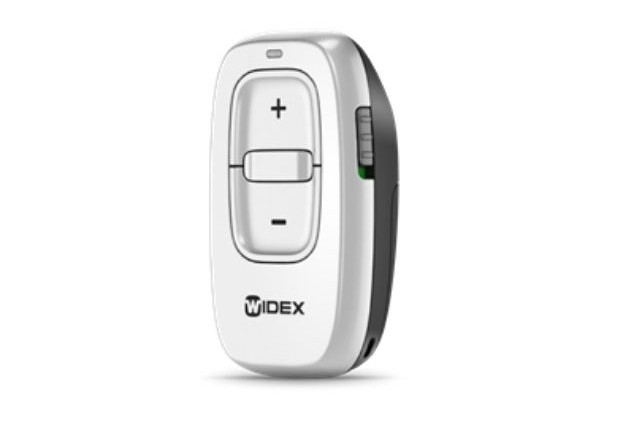
A remote control is a hearing aid accessory that allows the user to adjust the settings on their hearing aid without physically touching the device.
The remote control typically has buttons for adjusting the volume, selecting different listening programs, and muting the hearing aid, ideal if you don't use a smartphone or as an easy alternative to an app.
Some remote controls may also have additional features, such as the ability to change the volume of individual channels or to adjust the balance between the left and right hearing aids.
Widex's RC-DEX is a great example of a simple and intuitive remote control hearing aid accessory, as seen in the image.
All generic remote controls are usually small enough to fit on a keychain for convenience on the go. To use a remote control with a hearing aid, the hearing aid must be equipped with a wireless connectivity feature, such as Bluetooth. The remote control is then paired with the hearing aid, allowing the user to control the device remotely.
It's worth noting that not all hearing aids have the capability to be controlled with a remote, so it's important to check with the manufacturer or hearing healthcare professional to determine if a particular hearing aid is compatible with a remote control.
They can be used every day and purchased from your audiologist. Remote controls can be particularly useful for individuals with dexterity issues or for those who have difficulty reaching the hearing aid itself. They can also be convenient for adjusting the hearing aid in noisy environments where it may be difficult to hear the buttons on the device.

A phone adapter can improve your landline calls by connecting your hearing aids to a traditional landline phone. Supporting both outgoing and incoming calls. You can have more comfortable conversations with your landline phone with hearing aid accessories for phones. Oticon's Connect Phone Adapter is a great example, as shown in the image.
How do I get started, when to use, and where to buy a phone adapter hearing aid accessory?
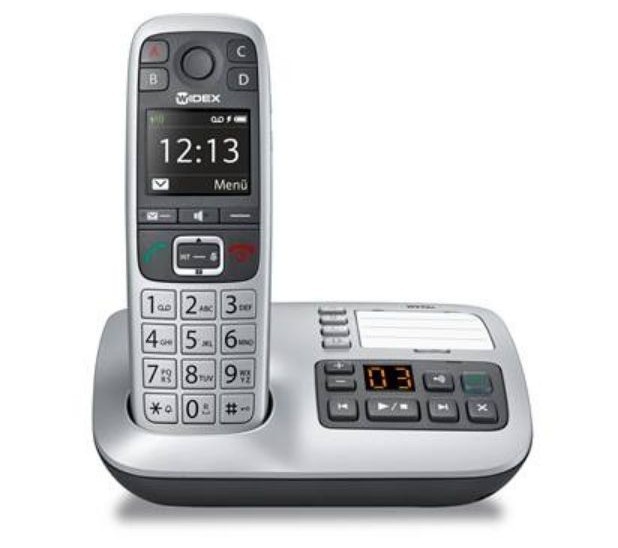
This type of telephone is designed for people with hearing loss. You can pair it with your hearing aids or use it as a conventional phone as well. Telephones for the hard of hearing provide you with excellent speech understanding in both ears.
Widex's PHONE-DEX is a great example of a cordless phone that gives clear sound straight to your hearing aids with ease. Giving you brilliant speech understanding in both ears at the same time, and can be used as a normal phone and you don't even need hearing aids with an inbuilt telecoil - without the annoyance of feedback!
When to use and where to buy a phone for the hard of hearing? They can be used every day, and you can wireless microphone from your audiologist.
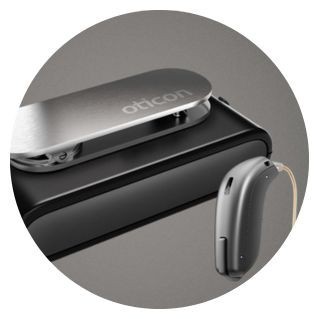
Wireless hearing aid accessories enable seamless connectivity between hearing aids and various audio sources such as smartphones, televisions, and computers. This connectivity allows users to stream audio directly to their hearing aids, ensuring a clear and personalised listening experience. It eliminates the need for bulky headphones or external devices.
Many wireless hearing aid accessories include remote microphones that can be placed near a speaker or worn by a conversation partner. These microphones transmit the speaker's voice directly to the hearing aids, significantly improving speech recognition and comprehension in challenging listening environments like noisy restaurants or crowded gatherings.
Wireless hearing aid accessories often come with remote control or smartphone apps, providing convenient and discreet control over hearing aid settings. Users can adjust volume, change programs, and even fine-tune specific sound frequencies without reaching for their hearing aids. This hands-free control feature enhances user autonomy and allows for effortless customisation.
Telecoils, also known as T-coils, are built-in components in many hearing aids. Wireless hearing aid accessories utilise telecoil technology, enabling users to connect with hearing loop systems commonly found in public spaces such as theaters, places of worship, and conference halls. This connectivity ensures optimal sound quality and accessibility in these environments.
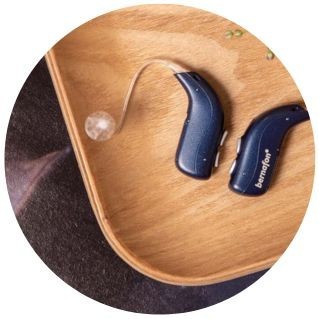
If your hearing aid supports wireless Bluetooth connectivity then we recommend investing in digital wireless accessories to seamlessly connect to your at-home devices like your TV. Bluetooth hearing aid accessories will greatly improve your quality of life and complement your lifestyle.
Generally, hearing aid accessories can be personalised to your unique hearing loss needs - ask your audiologist to show you what's available to you. You can also ask your audiologist to try an accessory before you purchase it. This way, you'll get a better idea of how beneficial they can be in real-life scenarios.
►Digital hearing aids with Bluetooth
►Rechargeable digital hearing aids
►Digital hearing aids for Tinnitus
Overall, hearing aid accessories can be valuable tools to be used in conjunction with your hearing aids to further improve their effectiveness and make them more convenient to use. Additionally by helping to improve the effectiveness of the devices, hearing aid accessories for independent living promote confidence and give an improved quality of life.
It's worth noting that the specific benefits of hearing aid accessories will depend on the individual's needs and preferences. Speak to your audiologist about these and which hearing aid accessories would suit your specific needs.
Call us free on 0800 567 7621 for support and advice with your hearing healthcare.
Do not spend hundreds of pounds without getting a second opinion from us.
 Not only are the prices great, but the service is fantastic! Many thanks to your team.
Not only are the prices great, but the service is fantastic! Many thanks to your team.Although most hearing aid wearers prefer to go through their own audiologist for their hearing aid accessories - you can source and purchase them online easily. If this is the route you wish to take, ensure that you research prices and the warranty policy.
As I mentioned earlier, a lot of our customers prefer to go through the audiologist we put them in touch with to source their hearing aid accessories. Most audiologists keep a small selection in stock of the popular hearing aid accessories, but if they don't have the accessory you require - they can order these products for you.
All the main manufacturers offer hearing aid accessories and assisted devices. Check with your audiologist on the compatibility requirements of your hearing aids.
We don't list the prices of accessories as they can vary quite a lot. Sometimes the manufacturers may include an accessory in with the cost of the aid, other times they will bundle several together so that for example a TV streamer and remote control will be less if purchased together than if bought individually.
As a general guide, TV streamer boxes, wireless mics, etc are between £100 and £250. Remote controls are between £40 and £120.
Does the NHS provide digital hearing aid accessories with their hearing aids? The short answer is no. Whilst the NHS provides a credible hearing health service and some good hearing solutions - they are currently unable to offer Bluetooth hearing aids accessories.
You can order hearing aid parts and spares from your audiologist, such as:
When we refer to a product as 'Latest Launch', we mean it is the latest to be released on the market.
When we refer to a product as 'New', we mean that the product is the newest hearing aid model on the market.
When we refer to a product as 'Superseded', we mean that there is a newer range available which replaces and improves on this product.
When we refer to a product as an 'Older Model', we mean that it is has been superseded by at least two more recent hearing aid ranges.